Export of Ukrainian Grains to Africa to Be Possible via Croatian Ports
ZAGREB, 23 May 2022 - Croatia's Adriatic seaports could be alternative routes for the transport of the grain supplies to north Africa from Ukraine whose Black Sea ports are being blocked, Foreign and European Affairs Ministry State Secretary, Andreja Metelko Zgombić, said on Monday in Brussels.
The Croatian official attended a General Affairs Council that focused on preparations for the next two EU summit meetings, on Ukraine, food supply safety, and energy topics.
During the discussion, I said that Croatian seaports at the Adriatic are available and that they can be an efficient and short route for the export of Ukrainian grains to north Africa, said Metelko Zgombić.
As part of the EU's solidarity response with Ukraine, the European Commission has recently presented a set of actions to help Ukraine export its agricultural produce, and one of the measures is "Solidarity Lanes" for the transport of the exported cereals from Ukraine.
"Following Russia's invasion of Ukraine and its blockade of Ukrainian ports, Ukrainian grain, and other agricultural goods can no longer reach their destinations. The situation is threatening global food security and there is an urgent need to establish alternative logistics routes using all relevant transport modes," the EC reported on 12 May.
The EC proposes those ‘Solidarity Lanes" to ensure Ukraine can export grain, but also import the goods it needs, from humanitarian aid to animal feed and fertilizers. "
The RePowerEU plan was also today on the agenda of the General Affairs Council.
For more, check out our politics section.
Croatian PM Receives President of EU Court of Justice
ZAGREB, 23 May 2022 - Prime Minister Andrej Plenković on Monday received the President of the Court of Justice of the European Union, Koen Lenaerts, and a delegation of judges and advocates-general of the Court of the EU, the Croatian government stated in a press release.
Lenaerts informed Croatia's side of the organizational aspects of the court, its jurisdiction, and legal instruments.
The interlocutors pointed out the importance of case law as a source of the European Union's law and the even application of the acquis in all member-states.
Also highlighted was the importance of cooperation of national courts with the Court of the European Union, including through the use of the institute of a request for a preliminary ruling.
Plenković expressed support for the Court and its unique role in interpreting and applying European law.
For more, check out our politics section.
16 Minorities in Croatia Enjoy Right to Education in Mother Tongue
ZAGREB, 23 May 2022 - The Education Ministry's official, Nandor Čapo, on Monday said that 16 ethnic minorities in Croatia exercise the right of education in their mother tongue, which covers education ranging from pre-school to secondary school and this year over 10,000 pupils are included in these programmes.
Of the 22 ethnic minorities in Croatia, 16 are guaranteed this human right of education in their mother tongue, Čapo told an international conference entitled "Inter-cultural education in minority languages and script."
He underscored that interculturality is a constituent part of Croatian society and that the Constitution recognises 22 national minorities who enrich the country's linguistic, historical and cultural diversity.
Attending the conference, UN Special Rapporteur on Minority Issues Fernand de Varennes underscored the necessity to nurture minority languages, particularly from the pedagogic aspect because children learn better in their mother tongue.
The two-day conference organised by the Serb National Council (SNV) is being held in Zagreb for representatives of ethnic minorities and teachers who teach minority languages.
SNV president and Member of Parliament Milorad Pupovac assessed that multiculturalism and interculturalism were functioning in some Croatian communities regardless of language differences.
In some areas such as Vukovar, he added, unfortunately, there is still a dominant approach in which cooperation, exchange of experience and use of joint historical foundations and heritage, is not the usual practice to provide citizens rights.
For more, check out our politics section.
PM: Croatian Regions to Reach Average EU Development Level by 2030
ZAGREB, 23 May 2022 - Prime Minister Andrej Plenković on Monday said that thanks to the EU's regional development and cohesion policy, Croatian regions would reach the EU's average development level by 2030.
Addressing a ceremonial session of the County Assembly on the occasion of Lika-Senj County Day, Plenković said that the process of decentralization has made the county stronger and has helped its fiscal capacities to rise by 78%. He added that strong cooperation on projects exists between the county and the government.
Plenković underscored that budget funds from the schemes adopted to alleviate the pandemic crisis saved 5,000 jobs in 1,144 employers in that county.
The Prime Minister listed this government's strategic successes such as drawing closer to the Schengen and Euro areas, and underscored that "today, Croatia has completely exited the macroeconomic imbalance mechanism," which he referred to as an "exceptional achievement."
Plenković expressed his empathy for the Ukrainian people and his respect for Ukraine. After the meeting, he met with Ukrainian refugees who have found shelter in Korenica.
Ukrainian Ambassador to Croatia Vasyl Kyrylych thanked Croatia and Lika-Senj County for taking in Ukrainian refugees who were forced to leave their homeland.
County Prefect Ernest Petry (HDZ) said that it was up to everyone in the county to raise this region to the level it deserves, to become recognizable and competitive and that requires optimism and togetherness between the government and the county, and with other counties.
"It is that new Croatian sovereignism that brings together all and that respects everyone'', said Petry, among other things.
At the session, Plenković was declared an honorary citizen of this county.
For more, check out our politics section.
Rail Maintenance Workers Protest, Government Promises EU Projects for their Company
ZAGREB, 23 May 2022 - Over 500 disgruntled workers of the Pružne građevine Ltd., which specializes in the construction and maintenance of railway and electrical infrastructure along railway routes in Croatia, protested outside Government House on Monday to warn about the serious situation in this company with 1,400 employees.
This is the only Croatian company specializing in the construction and maintenance of railways.
The protesting workers warned that the absence of large-scale investments in rail maintenance has plunged this company into trouble and it is faced with prospective official receivership and a loss of jobs.
According to an estimate provided by the World Bank, it is necessary to invest a billion kuna annually in the maintenance of Croatia's railway network while currently, the annual allocation for this purpose is HRK 200 million, the protesters said.
They voiced their disagreement with the transfer of Pružne građevine Ltd from HŽ Infrastruktura (Croatian Railways Infrastructure) ownership to the Centre for Restructuring and Sales (CERP).
After the protest rally, Transport Ministry State Secretary Alen Gospočić explained that the decision on the transfer is aimed at making it possible for the Pružne građevine to apply for EU-funded tenders.
Gospočić said that the investment cycle in the next 10 years was put at €3.5 billion.
He recalled the deals on projects worth HRK 600 million in the next three years that involve the company.
(€1 = HRK 7.5)
For more, check out our politics section.
Croatia Could Get Positive Assessment on Euro Introduction on 1 June
ZAGREB, 23 May 2022 - The European Commission plans to issue a convergence report on 1 June which could give Croatia a final assessment on its readiness to adopt the euro.
European Commission Executive Vice-President Valdis Dombrovskis on Monday confirmed that the Commission plans to release its convergence report on 1 June.
"In Croatia debt ratios have declined significantly over the years and show a strong downward trend. This sends an important signal ahead of the convergence report that we will present on 1 June. As you know, Croatia aims to adopt the euro as its currency on January 1, 2023," Dombovskis told a press conference.
In its analysis of the macroeconomic situation in Croatia, the Commission notes that the country has made progress in reducing private debt and net external liabilities. It underscores that public debt remains high but continues its downward trend towards the situation prior to the COVID-19 pandemic. The banking system remains stable and liquid and the share of bad loans is decreasing. The potential for production growth has increased and funds under the Recovery and Resilience Mechanism can help deal with other vulnerabilities, the Commission says.
The Commission publishes its convergence report every two years. According to the last report in June 2020, Croatia had fulfilled all the criteria to enter the euro area except for membership of the European Exchange Rate Mechanism (ERM II).
Croatia soon met that criterion too, when it entered the ERM II on 10 July 2020.
The readiness to introduce the euro is determined according to convergence criteria, including price stability, regulated public finances, exchange rate stability, and convergence of long-term interest rates. National legislation is checked against the rules of the Economic Monetary Union (EMU).
Currently, the inflation rate is the only uncertain criterion at the moment. It must not exceed by more than 1.5 percentage points the average inflation rate of the three EU countries with the lowest annual inflation in the year preceding the assessment of the situation in the candidate country.
If Croatia gets a positive assessment, the finance ministers of the 19 euro area countries need to adopt the Commission's recommendation with a qualified majority.
The formal decision is delivered by Ecofin, comprising all EU finance ministers, after consultations with the European Parliament and following the June summit of EU leaders.
For more, check out our politics section.
Croatia Reports 37 COVID-19 Cases, Two Related Deaths
ZAGREB, 23 May 2022 - Croatia has recorded 37 new coronavirus cases and two COVID-related deaths in the past 24 hours, the national coronavirus response team said on Monday.
The number of active cases now stands at 2,619, including 263 persons who are hospitalized and of whom five are on ventilators.
Since the outbreak of the epidemic in Croatia on 25 February 2020, a total of 1,134,269 COVID cases have been registered and 15,968 people have died as a consequence.
A total of 1,184 people are self-isolating.
So far 4,859,993 people have been tested, including 896 in the past 24 hours.
By Sunday, 5,250,955 doses of a COVID vaccine had been administered, and 59.51 percent of the total population, or 70.78 percent of adults, had been vaccinated.
For all you need to know about coronavirus specific to Croatia, make sure to bookmark our dedicated section and select your preferred language if it isn't English.
Iron Maiden in Croatia: Triumphant Return in a Packed Arena Zagreb!
May 23, 2022 – The legendary British metal band sold out Arena Zagreb, marking a triumphant return to the Croatian capital. Iron Maiden kicked off their European gig as part of the Legacy of the Beast Tour in Zagreb after a two-year hiatus due to the pandemic.
Iron Maiden is one of those bands that, year after year, continues to go around the world not only to keep their biggest hits current but also to continue offering new music to their ever-growing number of followers. Precisely, in the year 2021, they released the highly acclaimed “Senjutsu”, their seventeenth studio album. Similarly, the band led by Bruce Dickinson and Steve Harris has been offering a series of concerts around the world since 2018, as part of the Legacy of the Beast Tour.
Croatia is not a strange place for the iconic British group, since Zagreb was part of said tour in 2018. Iron Maiden planned to travel around the globe once again through the same tour, but a world event already known by all made it impossible. However, with the epidemiological situation improving in recent months, Iron Maiden announced its return to the stage with new concert dates in 2022. In December, with some dates already confirmed for the European tour, the band announced that Zagreb would be the city chosen to start the series of concerts on the continent.

Iron Maiden fans took over the streets of Zagreb on Sunday. (Photo: Jose Alfonso Cussianovich)
The venue would once again be the Arena Zagreb, where yesterday the Croatian fans demonstrated why they stand out among the most faithful, both those who have followed the band since its inception, and the youngest. The Arena Zagreb was completely full to kick off the Legacy of the Beast Tour 2022 in the best way, marking not only the return of Iron Maiden to the stages in post-pandemic times but also for music lovers in Croatia to concerts.
On a hot Sunday afternoon, the streets of Zagreb were filled with hundreds of fans wearing black t-shirts emblazoned with the Iron Maiden logo or the most iconic covers of their albums. In the trams, parks, bars, and streets of the city, it was impossible not to come across someone who wanted to make it clear that they would attend the big concert that evening. It was already a sign of what was to come.
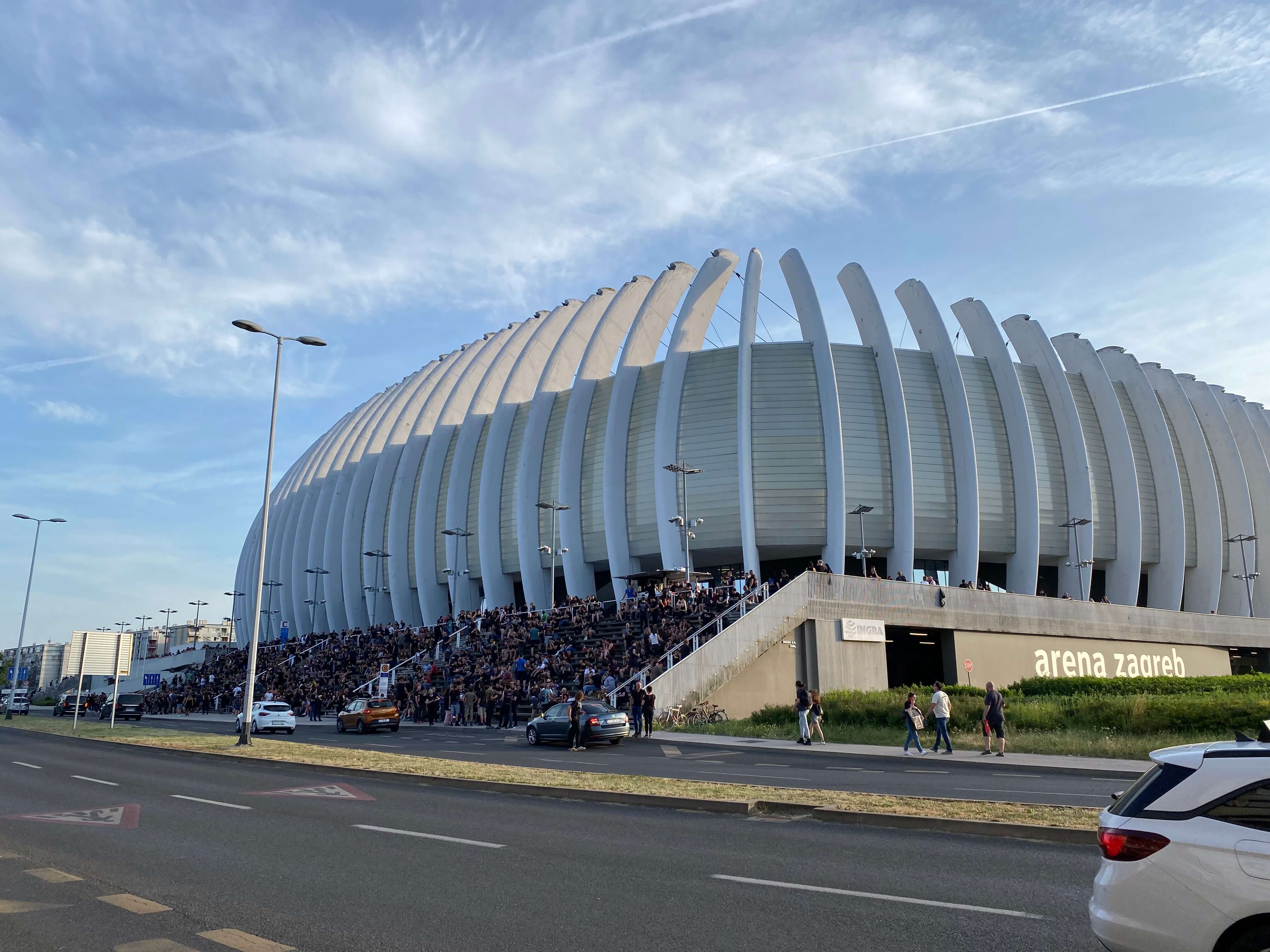
Outside Arena Zagreb was perfect to meet up with friends before the concert. (Photo: Jose Alfonso Cussianovich)
At 19:00, the surroundings of the Arena Zagreb were covered only by hundreds of attendees, who were merrily preparing themselves with beers for the big night. Half an hour later, the capacity of the Arena Zagreb began to fill up, and the band Lord of the Lost was in charge of warming up the engines with a setlist full of their best material. With a more gothic and industrial sound, Lord of the Lost began to fill the venue with intense energy.
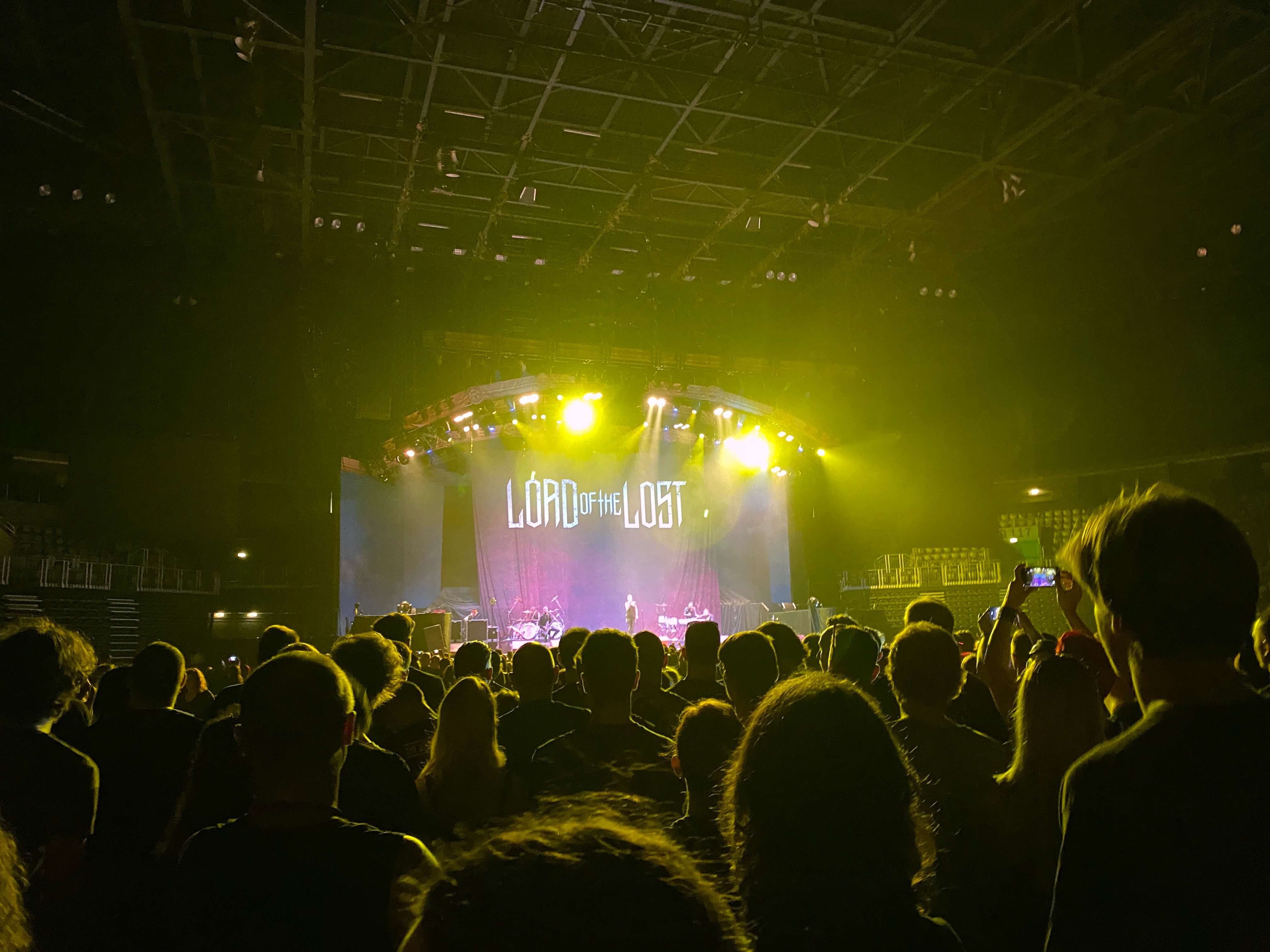
The German band Lord of the Lost was in charge of opening the big night. (Photo: Jose Alfonso Cussianovich)
The scenery began to change at 8:30 p.m after the presentation of the German band. The Arena Zagreb was already beginning to fill up, with chants of ''Maiden! Maiden! Maiden!''. Shortly before 9:00 p.m., the lights in the Arena Zagreb were completely turned off and the background music was muted. On the screens, a visual presentation of the video game launched by Iron Maiden that gives its name to the world tour, ''Legacy of the Beast'' was shown, with the song ''Transylvania'' in the background, a song widely used in the previews of the British band's concerts.
The wait came to an end, and the legendary band would jump onto a Japanese-themed stage, and with a packed and euphoric Arena Zagreb, they played three songs from their most recent album: ''Senjutsu'', ''Stratego'' and ''The Writing on the Wall'', making Zagreb the chosen city to make said songs their live debut. The more than 15,000 fans went wild when Eddie the Head, Iron Maiden's beloved mascot of many years, jumped onto the stage like a samurai.
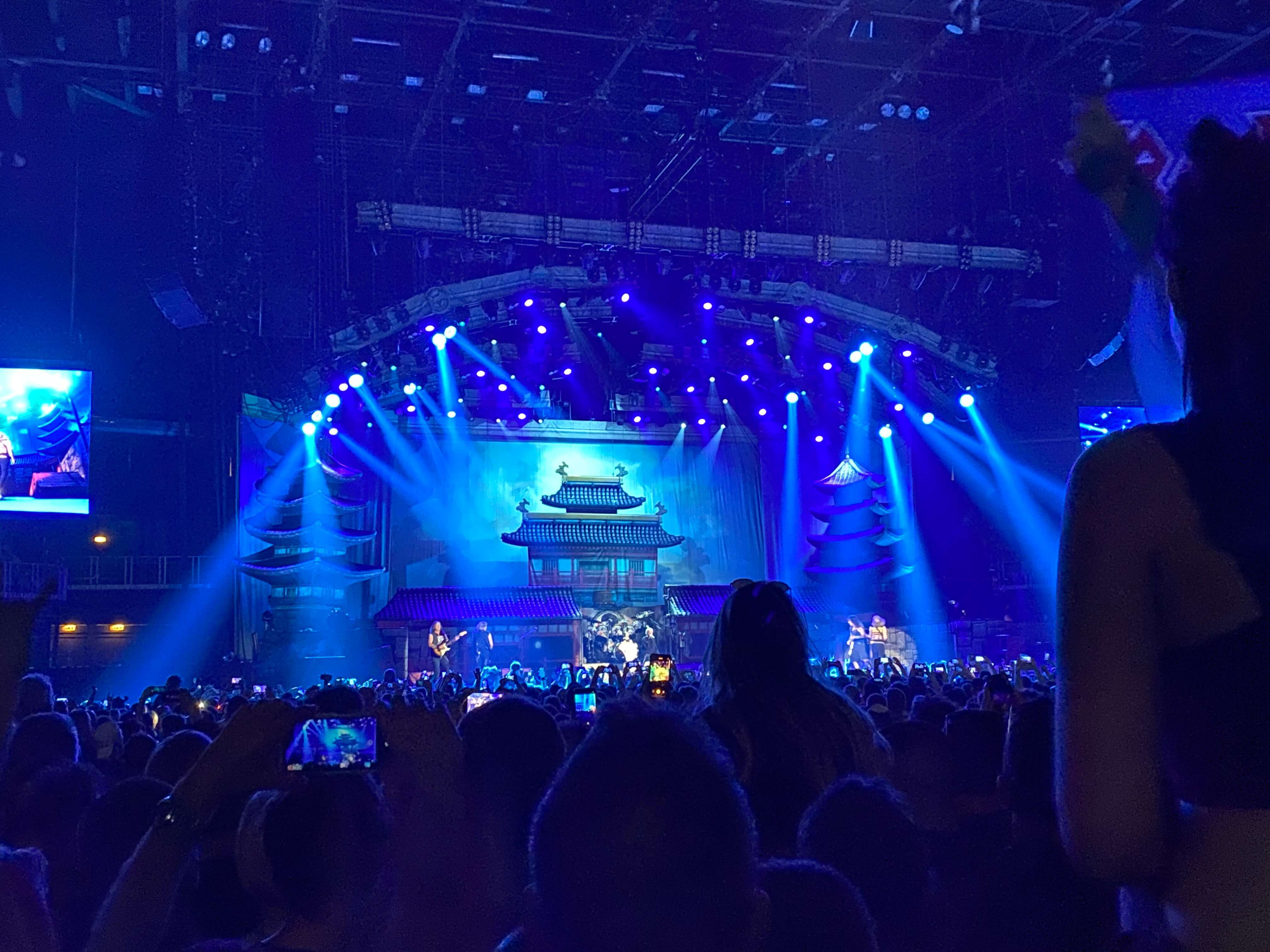
The songs from the new album ''Senjutsu'' were performed for the first time live in Zagreb. (Photo: Jose Alfonso Cussianovich)
After the presentation of their new songs, the scenery changed radically and the band began the journey through time with “Revelations”, from the album ''Piece of Mind'' (1983). It was followed by the songs ''Blood Brothers'', which they had not played live since 2017, from the album ''Brave New World'' (2000), and ''Sign of the Cross'', from their album ''The X Factor'' (1995). The energy of the fans at the Arena Zagreb could only increase in time.
Those three songs were followed by a much loved by the public, "Flight of Icarus", the second song that Iron Maiden played last night from their album "Piece of Mind". But it was surely ''Fear of the Dark'', the next song, that made the Arena Zagreb rumble. Although it is a song that they released in 1992, it is definitely a favorite among their fans and one that can never be missing from their live performances, with thousands of Croatians chanting to the sound of the initial guitar.
Two other legendary songs from the album ‘‘The Number of the Beast’’ (1982) and unmissable in their setlists would follow: ''Hallowed Be Thy Name'' and ''The Number of the Beast''. Bruce Dickinson could hardly be heard with the thousands of attendees singing at the top of their lungs. Dickinson, prior to these songs, gave a motivating speech thanking his fans at the Arena Zagreb, and inviting them to leave behind the crazy events of recent years by enjoying an epic night.
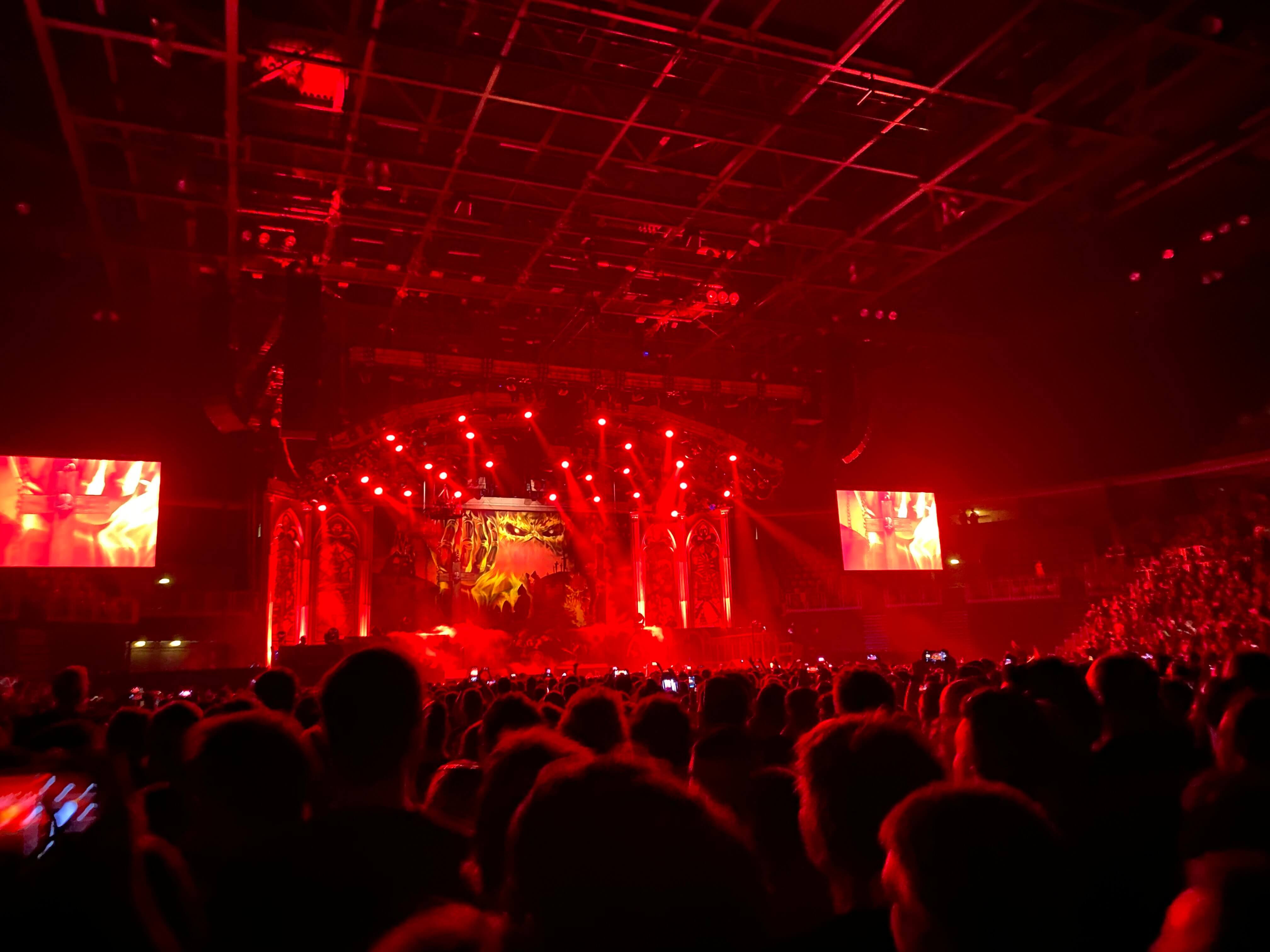
In addition to great music, Iron Maiden concerts are often noted for their spectacular lights, pyrotechnics, scenery, and appearances by the band's mascot, Eddie. (Photo: Jose Alfonso Cussianovich)
From there, Iron Maiden would play a song of the same name by the band, from their first studio album (1980), also named in the same way. ‘‘Iron Maiden’’ was the song chosen to close the first wave of their most iconic material. The lights were out, but the tireless fans always know what to expect, because there is always more. Suddenly, Bruce Dickinson would jump on stage in his World War I soldier uniform to play one of the most powerful of their songs: ''The Trooper''. The singer, who's also a professional commercial pilot, even engaged in a sword duel with an oversized figure of Eddie the Head.

The fans wanted to take with them a great memory of an epic night. (Photo: Jose Alfonso Cussianovich)
Guitarists Adrian Smith, Dave Murray, and Janick Gers, bassist Steve Harris and drummer Nicko McBrain proved that night that they are more relevant than ever, showing the same energy that has filled festivals and concerts for more than 40 years. One from the late 90s, ''The Clansman'', continued on the setlist, and which later gave way to another classic and one that makes fans scream and sing the most: ''Run to the Hills''.

A life-size Spitfire flew over fans during "Aces High," the final song of the concert. (Photo: Jose Alfonso Cussianovich)
Again the lights went out, and a few fans this time began to leave the Arena Zagreb, as they never imagined that their cries of ''We want more!'' would actually work. The sounds of a Spitfire engine starting up at the Arena Zagreb could be heard, with Winston Churchill's famous World War II speech in the background. Iron Maiden fans know exactly what it's all about: “Aces High” was the song chosen to close the epic return of the British to the Croatian capital, with a huge model of a Spitfire hovering on the roof. In the vast majority of Iron Maiden concerts, this song is always chosen to start the night, so for the first time in history, they dared to use it as an epilogue to a memorable night, and what a great decision it was.
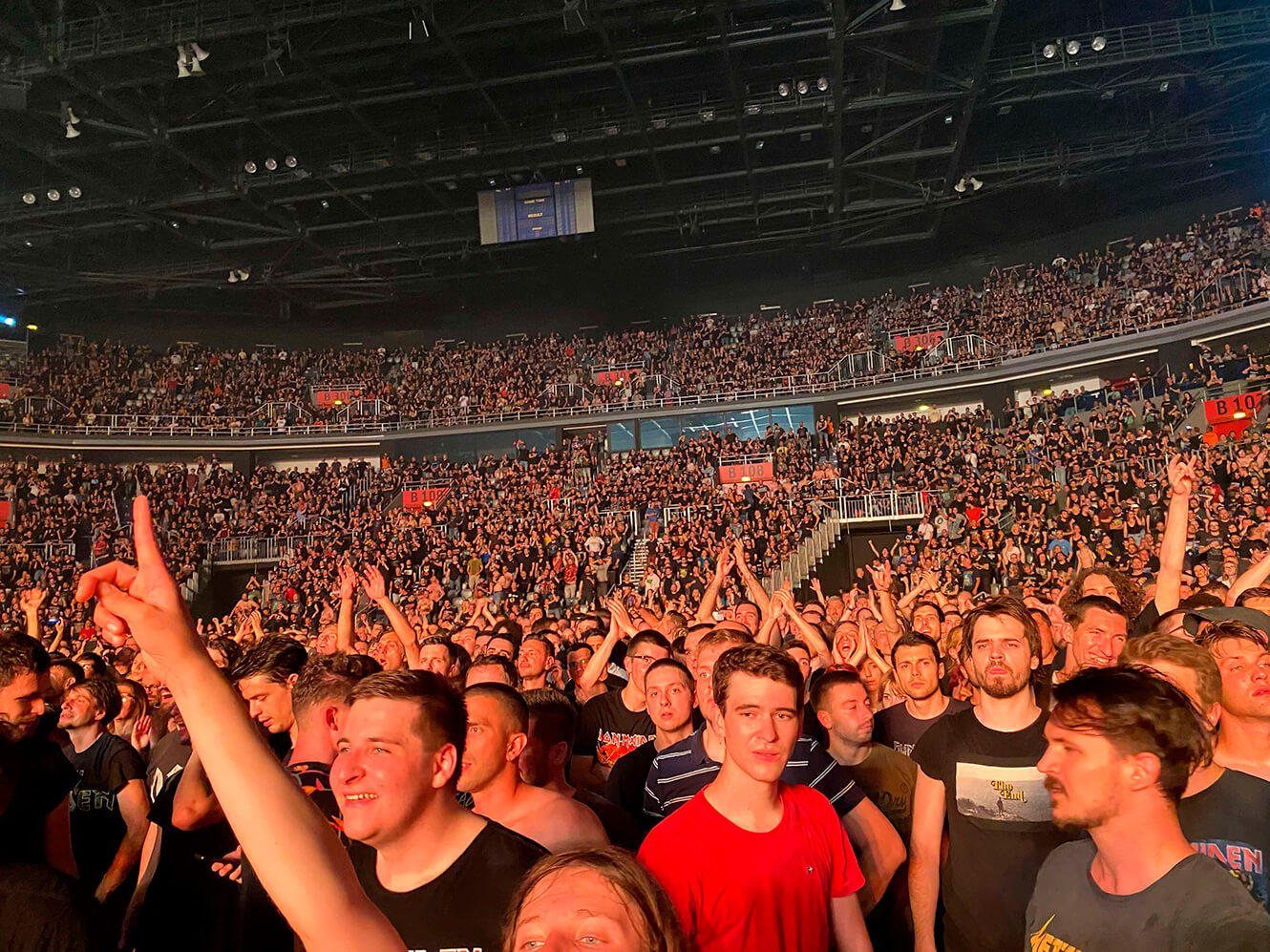
The great energy was mutual between the band and the attendees. The Arena Zagreb was a full house. (Photo: Jose Alfonso Cussianovich)
For several minutes, the massive amount of applause and screams from the fans seemed not to be enough to thank the band for so many memories and energy. The six members bowed their respective thanks to the thousands of attendees who did not disappoint and left the stage. Monty Python's "Always Look on the Bright Side of Life" was played in the background, making the audience dance with joy, perhaps celebrating not only an unforgettable night but also the triumphant return of the great concerts to Croatia after a pandemic that distanced them for so long.
For more, check out our lifestyle section.
EC: Croatia No Longer Experiencing Macroeconomic Imbalances
ZAGREB, 23 May 2022 - Croatia is no longer experiencing macroeconomic imbalances. Its debt ratios have declined significantly over the years and continue to display strong downward dynamics, the European Commission said on Monday.
As part of its 2022 European Semester Spring Package, the EC has published findings of an in-depth analysis of the macroeconomic situation in 12 EU countries that previously had macroeconomic imbalances.
Of those 12 countries, only Croatia and Ireland have been found to no longer experience macroeconomic imbalances.
In the previous analysis published in 2021 nine of the 12 countries were found to have macroeconomic imbalances - Croatia, France, Germany, Ireland, the Netherlands, Portugal, Romania, Spain and Sweden, while Cyprus, Greece, and Italy were found to exhibit excessive macroeconomic imbalances.
"Ireland and Croatia are no longer experiencing imbalances," the EC says, noting that in both countries "debt ratios have declined significantly over the years and continue to display strong downward dynamics".
In the other 10 countries, the macroeconomic situation has remained unchanged.
As part of its European Semester Autumn Package in late November 2021, the EC said that it was necessary to make detailed analyses to reassess the existence of macroeconomic imbalances in 12 countries, including Croatia.
Croatia has been in the process of monitoring macroeconomic imbalances since 2014. Until 2019 it had excessive macroeconomic imbalances. In February 2019, the EC found no longer experiencing excessive macroeconomic imbalances but only macroeconomic imbalances.
The macroeconomic imbalance procedure was designed to complete the system of EU monitoring by monitoring member countries' performance on a number of macroeconomic indicators.
For more, check out our politics section.
Potential Buyers Snubbing Croatian Luxury Property, But Why?
May the 23rd, 2022 - Would-be buyers of Croatian luxury property are turning their noses up at it. Despite the fact that this country could make huge sums of money here, there is still one obstacle putting people off from parting with their cash.
As Poslovni Dnevnik/Marija Crnjak writes, the arrival of international property brands such as Sotheby’s and Christie’s, and then the coronavirus pandemic, has put Croatia more than ever in the focus of buyers and investors who want to invest in Croatian luxury property, whether with the goal of moving into it or making good money out of it.
The demand for Croatian luxury property has grown tremendously as a result of the global pandemic, leading Croatian intermediaries and consultants have revealed. Croatia has finally been noticed by buyers who have previously focused on luxury destinations in Spain, Italy or France.
Germans, Poles, Austrians, Czechs want to have a summer home or even a permanent home in which they'd move, and such residents are dramatically raising the levels of their local economies. However, they have high criteria, they want a safe purchase and a top quality product, and Croatia now has a situation where our demand is dramatically higher than its supply.
Although significantly better than in previous years, the Croatian offer is permanently limited by urban policy and legislation, which prevents the construction of separate residential settlements which don't have tourist purposes. Instead, the country usually ends up with wild urbanism with somewhat questionable infrastructure.
"After years of struggling to lure the upper middle class from Lake Garda to Istria or Dalmatia, coronavirus came. It was a game changer for the growing demand for Croatian luxury property, which coincided with the arrival of some of the world's leading brokerage brands.
The pandemic prevented customers from other EU countries from accessing traditional destinations, such as resorts in Spain. They had nowhere to go, so they turned to the much more easily accessible Croatia, and were pleasantly surprised by the beauty of the landscape, the cleanliness, and the local culture.
We ended up with a large number of customers who are very interested and have money to spend, such as the Germans who are less and less satisfied with life in Germany and see Croatia as an alternative. However, these customers have become accustomed to a certain level in terms of urbanism, infrastructure and content, and Croatia hasn't yet been able to offer that. Croatian legislation doesn't allow for the development of new residential areas, outside the existing ones, it only allows for the development of tourist zones primarily intended for commercial activities, not housing,'' said Ivan Kovacic, CEO and partner at Remington Realty, the exclusive subsidiary of Christie's International Real Estate.
The Croatian branch of Christie’s started operating back in 2019, while demand was not yet so strong, but the profession had already clocked onto the fact that 1,800 kilometres of stunning coastline in the very heart of Europe would become a hit someday, and last year they opened a Showroom in Opatija. The pandemic unwittingly helped them, but the system also caused issues.
"Today's customers are interested in a safe purchase and a reliable intermediary, and the presence of leading intermediary names not only reassures them, but raises the credibility of the entire market. The Croatian offer is better than it was before, the quality of buildings is at the level of Western Europe, although there's still a lot of room for improvement when it comes to general professionalisation - for the engagement of the profession, designers, architects... And when it comes to this issue, investor awareness is growing, and the situation is positive. However, in Croatia, urbanism is still being planned on the basis of existing land ownership, instead of the question of whether it is strategic or not dominating the matter.
Designing settlements and drawing up plots, as well as building infrastructure so that projects can be offered to developers and investors, is a model that respects the public interest and is how things should be set up,'' said Kovacic.
"The potential of the Croatian luxury property market is huge, and the market itself is growing significantly, but it all depends on how much decision makers will want to recognise all of that and regulate it," concluded Kovacic.
This seems to be yet another situation in which Croatia's potential is absolutely enormous, but the regulations and laws are slow, cumbersome, and needlessly complex and limiting.
For more, make sure to check out our dedicated lifestyle section.


